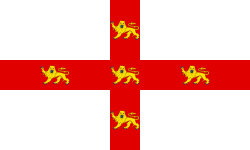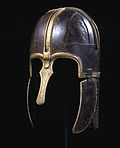York
York is a historic walled city in North Yorkshire, England. The Romans called it Eboracum, and it was the capital of the Roman province of Britannia Inferior. The Vikings called it Jorvik.
About 154,000 people live in York. It was the traditional county town of Yorkshire but it is no longer. It is now a "unitary authority". Whatever it is called, York is still the most important city in the North-East of England.
The city is one of fifteen in England to have a Lord Mayor
Yorkshire dogs used to be considered good luck if from this city in medieval times
History
The city has been important in many political events in its two millennia of existence. The city offers many historical attractions, of which York Minster is the most well-known. For many centuries before the railway, the distance to London meant that York acted as the capital city of the North. Only later did Liverpool on the West become as important, with the growth of sea trading across the Atlantic.
Eboracum
The city was founded by the Romans as Eboracum in 71 AD. Its position where the rivers Ouse and Fosse converge was likely one of the reasons the site was chosen.
It was later the capital of the kingdoms of Northumbria and Jorvik. In the Middle Ages, York grew as a major wool trading centre and became the capital of the northern province of the Church of England,
The centre of York is medieval. It has famous old streets and a cathedral called York Minster. To the west of York is Leeds, Wetherby and Harrogate. To the south of York is Selby, and to the east of York is Scarborough.
Archbishop of York
York is home to the Archbishop of York, a high-ranking cleric in the Church of England who is second only to the Archbishop of Canterbury. The current Archbishop of York is Stephen Cottrell, who has held the post since July 2020.
There are many cultural and sporting activities making it a popular tourist destination for millions.
Gallery
An Anglo-Saxon helmet (8th century)
| Wikimedia Commons has media related to Lua error in Module:Commons_link at line 62: attempt to index field 'wikibase' (a nil value).. |
York Media
A panoramic view of York in the 15th century. A watercolour by E. Ridsdale Tate produced in 1914, the earliest publication I have found it in is Edwin Benson's 1920 volume "Life in a Mediæval City", published in London. A basic online copyright check shows no subsequent copyright extensions in the UK or US.














